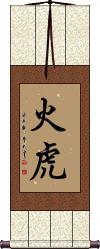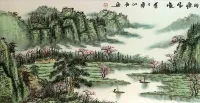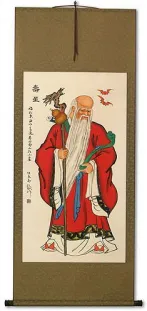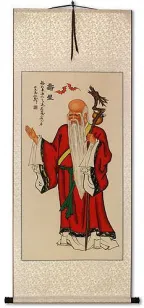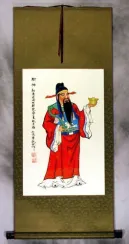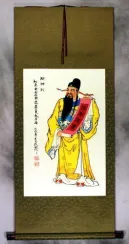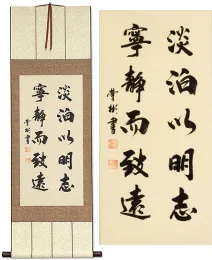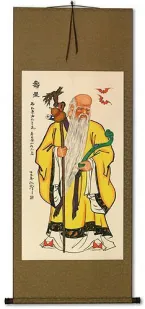Many custom options...
And formats...

Will of Fire in Chinese / Japanese...
Buy a Will of Fire calligraphy wall scroll here!
Personalize your custom “Will of Fire” project by clicking the button next to your favorite “Will of Fire” title below...
Will of Fire
Fire Tiger
火虎 is the Chinese and Japanese title for “fire tiger.”
If you were born between 9 Feb 1986 and 28 Jan 1987, or between 13 Feb 1926 and 1 Feb 1927, you are a fire tiger according to the Chinese Zodiac.
There are 12 animals and 5 elements in the cycle. Therefore, the fire tiger comes around once every 60 years. The next will be in 2046.
The branch of the zodiac for tiger is written 寅 when dating ancient documents and artwork, but 虎 is the way to write the character for an actual tiger.
Phoenix Rise from the Ashes
鳳凰涅磐 is a proverb that suggests “Legendary Phoenix rises from the ashes.” It means “Legendary Phoenix [reaches] Nirvana.”
There is a legend in China of a great bird reborn once every 500 years. This bird gathers all the ill will, suffering, desire, and other negative things of the world. The bird then plunges into the fire to burn away all negative things, sacrificing itself in the process (achieving Nirvana, or perhaps allowing others the opportunity to reach Nirvana).
500 years later, the phoenix is reborn from the ashes again, and the cycle repeats.
This in-stock artwork might be what you are looking for, and ships right away...
Gallery Price: $61.00
Your Price: $33.88
Gallery Price: $61.00
Your Price: $33.88
Gallery Price: $61.00
Your Price: $33.88
Gallery Price: $61.00
Your Price: $33.88
Gallery Price: $400.00
Your Price: $138.88
Gallery Price: $198.00
Your Price: $109.88
Gallery Price: $55.00
Your Price: $19.88
Not the results for Will of Fire that you were looking for?
Below are some entries from our dictionary that may match your Will of Fire search...
| Characters If shown, 2nd row is Simp. Chinese |
Pronunciation Romanization |
Simple Dictionary Definition |
火 see styles |
huǒ huo3 huo hi ひ |
More info & calligraphy: Fire(n,n-suf) fire; flame; blaze Fire, flame. Śikhin 尸棄; 式棄, which means fire in the sense of flame, is the name of the 999th Buddha of the kalpa preceding this. |
盧 卢 see styles |
lú lu2 lu rou / ro ろう |
More info & calligraphy: Loup(surname) Rou A rice-vessel; a fire-pan; dram-shop; black; translit. lo, ro, ru; cf. 樓; 路; 流. |
五大 see styles |
wǔ dà wu3 da4 wu ta godai ごだい |
More info & calligraphy: Godai / Five ElementsThe five elements— earth, water, fire, wind, and space. v. also 五行 the five agents. In the esoteric cult the five are the physical manifestation, or garbhadhātu, v. 胎; as being in all phenomena they are called 五輪 the five evolvers; their phonetic embryos 種子 are those of the Five Dhyani-Buddhas of the five directions, v. 五佛. |
五行 see styles |
wǔ xíng wu3 xing2 wu hsing gogyou / gogyo ごぎょう |
More info & calligraphy: Five Elements(1) (See 五大・ごだい・1) the five elements (in Chinese philosophy: wood, fire, earth, metal and water); the five phases; wu xing; (2) {Buddh} five practices of the Bodhisattvas; (3) (See 六信五行) the five pillars of Islam; (surname, given name) Gogyou The five lines of conduct. I. According to the 起信論 Awakening of Faith they are almsgiving; keeping the commandments; patience under insult; zeal or progress; meditation. II. According to the 涅槃經 Nirvana Sutra they are saintly or bodhisattva deeds; arhat, or noble deeds; deva deeds; children's deeds (i. e. normal good deeds of men, devas, and Hinayanists); sickness conditions, e. g. illness, delusion, etc.; — into all these lines of conduct and conditions a Bodhisattva enters. III. The five elements, or tanmātra— wood, fire, earth, metal, and water; or earth, water, ire, air, and ether (or space) as taught by the later Mahāyāna philosophy; idem 五大. |
四大 see styles |
sì dà si4 da4 ssu ta shidai しだい |
More info & calligraphy: Shidai / Sida / Mahabhuta(1) {Buddh} the four elements (earth, water, fire, wind); (2) the human body; (3) Tao, heaven, earth and king mahābhūta, 四界; 四大界. The four elements of which all things are made; or the four realms; i. e. earth, water, fire, and wind (or air); they represent 堅, 濕, 煖, and 動 solid, liquid, heat, and motion; motion produces and maintains life. As 實 active or formative forces they are styled 四界 (四大界) ; as 假 passive or material objects they are 四大; but the 成實論 Satyasiddhi śāstra disputes the 實 and recognizes only the 假. |
毒蛇 see styles |
dú shé du2 she2 tu she dokuja; dokuhebi どくじゃ; どくへび |
More info & calligraphy: Vipervenomous snake; poisonous snake A poisonous snake.; Poisonous snakes, the four elements of the body— earth, water, fire, wind (or air)— which harm a man by their variation, i. e. increase and decrease. Also, gold. |
水龍 水龙 see styles |
shuǐ lóng shui3 long2 shui lung |
More info & calligraphy: Water Dragon |
洛基 see styles |
luò jī luo4 ji1 lo chi |
More info & calligraphy: Loki |
火狗 see styles |
huǒ gǒu huo3 gou3 huo kou kaku |
More info & calligraphy: Fire Dog |
火蛇 see styles |
huǒ shé huo3 she2 huo she kaja |
More info & calligraphy: Fire Snake |
聖火 圣火 see styles |
shèng huǒ sheng4 huo3 sheng huo seika / seka せいか |
More info & calligraphy: Sacred Fire(1) sacred fire; sacred flame; (2) (See オリンピック聖火) Olympic flame; Olympic torch; (given name) Seika |
不動明王 不动明王 see styles |
bù dòng míng wáng bu4 dong4 ming2 wang2 pu tung ming wang fudoumyouou / fudomyoo ふどうみょうおう |
More info & calligraphy: Fudo Myo-o / Wisdom King不動尊 Aryacalanatha 阿奢羅曩 tr. 不動尊 and 無動尊 and Acalaceta, 阿奢囉逝吒 tr. 不動使者. The mouthpiece or messenger, e. g. the Mercury, of the Buddhas; and the chief of the five Ming Wang. He is regarded as the third person in the Vairocana trinity. He has a fierce mien overawing all evil spirits. He is said to have attained to Buddhahood, but also still to retain his position with Vairocana. He has many descriptive titles, e. g. 無量力神通無動者; 不動忿怒王, etc. Five different verbal signs are given to him. He carries a sharp wisdom-sword, a noose, a thunder-bolt. The colour of his images is various—black, blue, purple. He has a youthful appearance; his hair falls over his left shoulder; he stands or sits on a rock; left eye closed; mouth shut, teeth gripping upper lip, wrinkled forehead, seven locks of hair, full-bodied, A second representation is with four faces and four arms, angry mien, protruding teeth, with fames around him. A third with necklaces. A fourth, red, seated on a rock, fames, trident, etc. There are other forms. He has fourteen distinguishing symbols, and many dharanis associated with the realm of fire, of saving those in distress, and of wisdom. He has two messengers 二童子 Kimkara 矜羯羅 and Cetaka 制吒迦, and, including these, a group of eight messengers 八大童子 each with image, symbol, word-sign, etc. Cf. 不動佛. |
四大元素 see styles |
yondaigenso よんだいげんそ |
More info & calligraphy: Earth Fire Water Air |
地水火風 地水火风 see styles |
dì shuǐ huǒ fēng di4 shui3 huo3 feng1 ti shui huo feng chisuikafuu; jisuikafuu / chisuikafu; jisuikafu ちすいかふう; じすいかふう |
More info & calligraphy: Four Elementsearth, water, fire, wind |
水火無情 水火无情 see styles |
shuǐ huǒ wú qíng shui3 huo3 wu2 qing2 shui huo wu ch`ing shui huo wu ching |
More info & calligraphy: Fire and Water Have No Mercy |
爐火純青 炉火纯青 see styles |
lú huǒ - chún qīng lu2 huo3 - chun2 qing1 lu huo - ch`un ch`ing lu huo - chun ching |
More info & calligraphy: Green Fire |
風林火山 see styles |
fuurinkazan / furinkazan ふうりんかざん |
More info & calligraphy: Furinkazan |
地水火風空 see styles |
chisuikafuukuu; jisuikafuukuu / chisuikafuku; jisuikafuku ちすいかふうくう; じすいかふうくう |
More info & calligraphy: Five Elements |
丙 see styles |
bǐng bing3 ping hei(p); hinoe / he(p); hinoe へい(P); ひのえ |
third of the ten Heavenly Stems 十天干[shi2 tian1 gan1]; third in order; letter "C" or Roman "III" in list "A, B, C", or "I, II, III" etc; ancient Chinese compass point: 165°; propyl (1) (へい only) (See 甲乙丙丁) third rank; third class; third person (in a contract, etc.); (2) (esp. ひのえ) third sign of the Chinese calendar; (personal name) Minezaki Fire, heat, south; the third of the ten stems. |
印 see styles |
yìn yin4 yin in いん |
to print; to mark; to engrave; a seal; a print; a stamp; a mark; a trace; image (1) stamp; seal; chop; (2) seal impression; seal; sealing; stamp; mark; print; (3) {Buddh} mudra (symbolic hand gesture); (4) ninja hand sign; (5) (abbreviation) (See 印度・インド) India; (surname) In mudrā; seal, sign, symbol, emblem, proof, assurance, approve; also 印契; 契印; 印相. Manual signs indicative of various ideas, e. g. each finger represents one of the five primary elements, earth, water, fire, air, and space, beginning with the little finger; the left hand represents 定 stillness, or meditation, the right hand 慧 discernment or wisdom; they have also many other indications. Also, the various symbols of the Buddhas and Bodhisattvas, e. g. the thunderbolt; cf. 因.; (度) The five Indias, or five regions of India, idem 五天竺 q. v. |
大 see styles |
dài dai4 tai dai だい |
see 大夫[dai4 fu5] (pref,adj-na,n) (1) large; big; great; huge; vast; major; important; serious; severe; (prefix) (2) great; prominent; eminent; distinguished; (suffix) (3) -sized; as big as; the size of; (suffix noun) (4) (abbreviation) (See 大学・1) university; (5) large (e.g. serving size); large option; (6) (abbreviation) (See 大の月) long month (i.e. having 31 days); (given name) Yutaka Maha. 摩訶; 麼賀. Great, large, big; all pervading, all-embracing; numerous 多; surpassing ; mysterious 妙; beyond comprehension 不可思議; omnipresent 體無不在. The elements, or essential things, i.e. (a) 三大 The three all-pervasive qualities of the 眞如 q.v. : its 體, 相 , 用 substance, form, and functions, v. 起信論 . (b) 四大 The four tanmātra or elements, earth, water, fire, air (or wind) of the 倶舍論. (c)五大 The five, i.e. the last four and space 空, v. 大日經. (d) 六大 The six elements, earth, water, fire, wind, space (or ether), mind 識. Hīnayāna, emphasizing impersonality 人空, considers these six as the elements of all sentient beings; Mahāyāna, emphasizing the unreality of all things 法空, counts them as elements, but fluid in a flowing stream of life, with mind 識 dominant; the esoteric sect emphasizing nonproduction, or non-creation, regards them as universal and as the Absolute in differentiation. (e) 七大 The 楞嚴經 adds 見 perception, to the six above named to cover the perceptions of the six organs 根. |
撥 拨 see styles |
bō bo1 po hatsu ばち |
to push aside with the hand, foot, a stick etc; to dial; to allocate; to set aside (money); to poke (the fire); to pluck (a string instrument); to turn round; classifier: group, batch (1) plectrum; pick; (2) drumstick for Japanese drums (e.g. taiko) To spread, open out, scatter, disseminate, detach, uproot. |
擻 擞 see styles |
sòu sou4 sou |
(dialect) to stoke the embers (to revive a fire); Taiwan pr. [sou3] |
擼 撸 see styles |
lū lu1 lu |
(dialect) to rub one's hand along; to fire (an employee); to reprimand |
旺 see styles |
wàng wang4 wang hikaru ひかる |
prosperous; flourishing; (of flowers) blooming; (of fire) roaring (female given name) Hikaru |
滅 灭 see styles |
miè mie4 mieh metsu |
to extinguish or put out; to go out (of a fire etc); to exterminate or wipe out; to drown Extinguish, exterminate, destroy; a tr. of nirodha, suppression, annihilation; of nirvāṇa, blown out, extinguished, dead, perfect rest, highest felicity, etc.; and of nivṛtti, cessation, disappearance. nirodha is the third of the four axioms: 苦, 集, 滅, 道 pain, its focussing, its cessation (or cure), the way of such cure. Various ideas are expressed as to the meaning of 滅, i.e. annihilation or extinction of existence; or of rebirth and mortal existence; or of the passions as the cause of pain; and it is the two latter views which generally prevail; cf. M017574 10 strokes. |
灬 see styles |
huǒ huo3 huo |
"fire" radical in Chinese characters (Kangxi radical 86), occurring in 熙, 然, 熊 etc |
灴 see styles |
hóng hong2 hung |
to bake, to roast; to dry at a fire |
炆 see styles |
wén wen2 wen |
(Cantonese) to simmer; to cook over a slow fire |
炌 see styles |
kài kai4 k`ai kai |
flaming fire; old variant of 烗[kai4] |
Click here for more Will of Fire results from our dictionary
The following table may be helpful for those studying Chinese or Japanese...
| Title | Characters | Romaji (Romanized Japanese) | Various forms of Romanized Chinese | |
| Will of Fire | 火の意志 | hi no ishi / hinoishi | ||
| Fire Tiger | 火虎 | hi tora / hitora | huǒ hǔ / huo3 hu3 / huo hu / huohu | |
| Phoenix Rise from the Ashes | 鳳凰涅磐 凤凰涅磐 | fèng huáng niè pán feng4 huang2 nie4 pan2 feng huang nie pan fenghuangniepan | feng huang nieh p`an fenghuangniehpan feng huang nieh pan |
|
| In some entries above you will see that characters have different versions above and below a line. In these cases, the characters above the line are Traditional Chinese, while the ones below are Simplified Chinese. | ||||
Successful Chinese Character and Japanese Kanji calligraphy searches within the last few hours...

